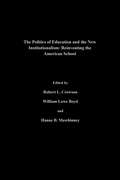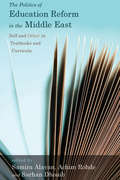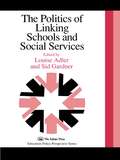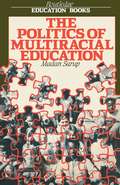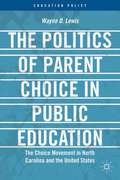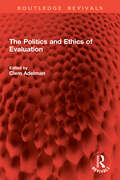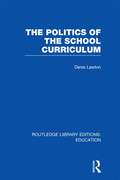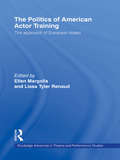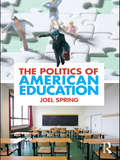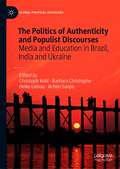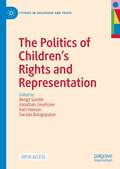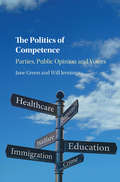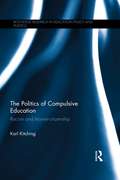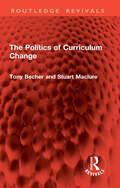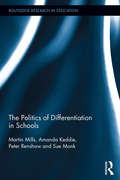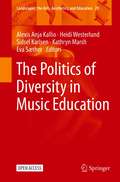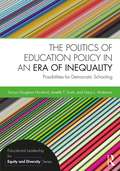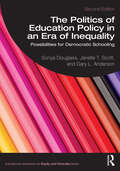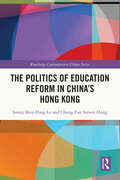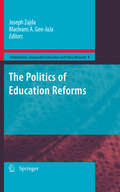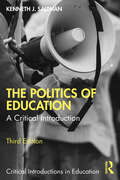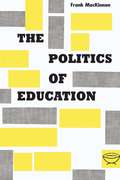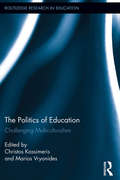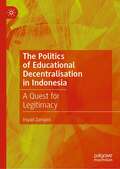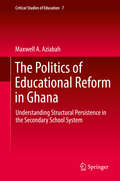- Table View
- List View
The Politics Of Education And The New Institutionalism: Reinventing The American School (Education Policy Perspectives Ser. #No.38)
by Robert L. Crowson William Lowe Boyd Hanne M. MawhinneyFirst Published in 1996. Routledge is an imprint of Taylor & Francis, an informa company.
The Politics Of Education Reform In The Middle East
by Achim Rohde Samira Alayan Sarhan DhouibEducation systems and textbooks in selected countries of the Middle East are increasingly the subject of debate. This volume presents and analyzes the major trends as well as the scope and the limits of education reform initiatives undertaken in recent years. In curricula and teaching materials, representations of the "Self" and the "Other" offer insights into the contemporary dynamics of identity politics. By building on a network of scholars working in various countries in the Middle East itself, this book aims to contribute to the evolution of a field of comparative education studies in this region.
The Politics Of Linking Schools And Social Services: The 1993 Yearbook Of The Politics Of Education Association (Education Policy Perspectives Ser.)
by Louise Adler Sid GardnerFrom the time the reform movement began in the progressive era with concerns about public health and universal access to education, arguments have been raised for and against linking schools and social services, and the merits or otherwise of each system.; A new argument for the collaboration is that integration will lead to substantially better services than those provided by separate organizations.; This volume brings together a wide array of cross-national research and public policy issues to focus on a new framework of service provision. It looks at the different networks of organizations of which schools and social services have been a part, and at the political implications or results of bringing together the professionals from such organizations. It takes into account the constraints resulting from the larger institutional network experience by such organizations. The book also presents a range of perspectives on the way preparation is followed by four responses that present somewhat varying points of view.; The contributors come from a wide range of experiences including specialists in politics of education, law, urban studies, children's issues and those providing reflections on practical experience.
The Politics Of Multiracial Education
by Madan SarupIn this book Madan Sarup describes recent developments in multi-racial education and makes a sustained critique of approaches based on the assumptions of psychology, 'equality of opportunity' and 'cultural pluralism'.
The Politics Of Parent Choice In Public Education
by Wayne D. LewisThis is the story of North Carolina parent choice advocates' push for the creation and expansion of choice policies. The exploration of the politics, ideology, and interests surrounding parent choice includes but also stretches beyond the most frequently discussed choice policies of charter schools, school vouchers, and tuition tax credits.
The Politics and Ethics of Evaluation (Routledge Revivals)
by Clem AdelmanFirst published in 1984, The Politics and Ethics of Evaluation considers, from the vantage point of the authors’ considerable experience of a wide range of evaluation, the ways in which they, and others, have coped with ethical and political problems that inherently arise during the evaluation process, particularly that of the responsive or democratic type. It looks at the evaluator’s claim to independence and how this is qualified by his relationship to his subject and to various other audiences.The ethical and political problems of evaluation are discussed from the different perspectives of moral philosophy, sociology, the politics of organisations, curriculum development, and institutional evaluation. Also included is a chapter detailing English law and legal judgements pertaining to qualified privilege, libel and defamation of character. Guidelines for conducting independent evaluation conclude the volume. This book will be of interest to students and researchers of higher education, curriculum studies and ethics.
The Politics of the School Curriculum (Routledge Library Editions: Education)
by Denis LawtonIf the curriculum can be defined as a ‘selection from the culture of society’, the central question then becomes ‘who selects’. This volume answers this question, reviewing various aspects of the curriculum and its planning. For many years the control of the curriculum was uncontroversial. In the 1970s this situation changed: teachers were increasingly criticised for having too much power; the Department of Education was suspected of wanting more control and local education authorities felt they should be more involved in curriculum planning. In reviewing some of the reasons for these conflicting pressures, two central themes emerge: first, the change from a partnership model of control to a complex system of accountability; and second the fact that these and many other changes which occur tend to be brought about as a result of secret decisions and central manipulation rather than through open negotiation. Among the areas covered are the changing position of teachers and the Department of Education, the influence of examinations on the curriculum, and some political aspects of curriculum evaluation and the different models used.
The Politics of American Actor Training (Routledge Advances in Theatre & Performance Studies)
by Ellen Margolis Lissa Tyler RenaudThis book addresses the historical, social, colonial, and administrative contexts that determine today's U.S. actor training, as well as matters of identity politics, access, and marginalization as they emerge in classrooms and rehearsal halls. It considers persistent, questioning voices about our nation’s acting training as it stands, thereby contributing to the national dialogue the diverse perspectives and proposals needed to keep American actor training dynamic and germane, both within the U.S. and abroad. Prominent academics and artists view actor training through a political, cultural or ethical lens, tackling fraught topics about power as it plays out in acting curricula and classrooms. The essays in this volume offer a survey of trends in thinking on actor training and investigate the way American theatre expresses our national identity through the globalization of arts education policy and in the politics of our curriculum decisions.
The Politics of American Education
by Joel SpringTurning his distinctive analytical lens to the politics of American education, Joel Spring looks at contemporary educational policy issues from theoretical, practical, and historical perspectives. This comprehensive overview documents and explains who influences educational policy and how, bringing to life the realities of schooling in the 21st century and revealing the ongoing ideological struggles at play. Coverage includes the influence of global organizations on American school policies and the impact of emerging open source and other forms of electronic textbooks. Thought-provoking, lucid, original in its conceptual framework and rich with engaging examples from the real world, this text is timely and useful for understanding the big picture and the micro-level intricacies of the multiple forces at work in controlling U.S. public schools . It is the text of choice for any course that covers or addresses the politics of American education. Companion Website: The interactive Companion Website accompanying this text includes relevant data, public domain documents, YouTube links, and links to websites representing political organizations and interest groups involved in education.
The Politics of Authenticity and Populist Discourses: Media and Education in Brazil, India and Ukraine (Global Political Sociology)
by Christoph Kohl Heike Liebau Barbara Christophe Achim SaupeThis edited volume breaks new ground and opens up new perspectives by capturing the role played by claims to authenticity in populist discourses in Brazil, India and Ukraine. By conceiving of both triumphant populism and increasing demands for authenticity as expressions of crisis, the volume seeks to satisfy the need to take a closer look at yearnings for orientation in a globalised world that is often associated with rapid social change and the disappearance of old certainties. Starting from the assumption that media play a crucial role for populist discourses of authenticity, the volume moves beyond conventional and social media by expanding its focus to media in formal education, notably school textbooks and curricula. These two particular media formats lastingly shape younger generations and thus the future. The proposed volume adopts global perspectives from three postcolonial countries that are often beyond the scope of studies dealing with populist discourses and media entanglements – insights that contribute new aspects to international scholarly debates.
The Politics of Children’s Rights and Representation (Studies in Childhood and Youth)
by Karl Hanson Sarada Balagopalan Bengt Sandin Jonathan JosefssonThis open access edited volume investigates children and youth's deep entanglement in today's major global, national, and local transformations and processes: wherein they are not mere spectators and objects of transformations but instead actively shape them through various social, economic, and political representations. International contributions illuminate the problems that arise when children's rights and participation become a site of contestation and power over who represents whom, what, when, and where. The authors do not provide simple solutions, instead offering an understanding of the fundamental nature of these problems as founded in the application of rights and the nature of representation in modern society. Together, the authors emphasize that child representation must take into account the local and spatial context of how representations of children are discussed, as well as possible discrepancies between local, regional, national, and global processes.
The Politics of Competence: Parties, Public Opinion and Voters
by Jane Green Will JenningsUsing decades of public opinion data from the US, UK, Australia, Germany and Canada, and distinguishing between three concepts - issue ownership, performance and generalised competence - Green and Jennings show how political parties come to gain or lose 'ownership' of issues, how they are judged on their performance in government across policy issues and how they develop a reputation for competence (or incompetence) over a period in office. Their analysis tracks the major events causing people to re-evaluate party reputations and the costs of governing which cause electorates to punish parties in power. They reveal why, when and how these movements in public opinion matter to elections. The implications are important for long-standing debates about performance and partisanship, and reveal that public opinion about party and governing competence is, to a great extent, the product of major shocks and predictable dynamics.
The Politics of Compulsive Education: Racism and learner-citizenship (Routledge Research in Education Policy and Politics)
by Karl KitchingThe marketised and securitised shaping of formal education sites in terms of risk prevention strategies have transformed what it means to be a learner and a citizen. In this book, Karl Kitching explores racialised dimensions to suggest how individuals and collectives are increasingly made responsible for their own welfare as ‘good’ or ‘bad’ students, at the expense of the protection of their rights as learner-citizens. Focusing on Ireland as a post-colonial Atlantic state, the book demonstrates how liberal governance, racisms, migration and mass education are interconnected and struggled over at local, national, European and global levels. Using a variety of qualitative studies and analytic approaches, The Politics of Compulsive Education details the significance of mass education(s) to the ongoing racialisation of national sovereignty. It draws on in-depth historical, policy, media and school-based research, moving from the 19th century to the present day. Chapters explore diverse themes such as student deportation, austerity and the politics of community ‘integration’, the depoliticisation of third level education via international student and ‘quality’ teacher regimes, the racialised distribution of learner ‘ability’, and school-based bullying and harassment. Combined, these studies demonstrate the possibilities and constraints that exist for educational anti-racisms both in terms of social movements and everyday classroom situations. The Politics of Compulsive Education asks key questions about anti-racist responsibility across multiple education sites and explores how racisms are both shaped, and can be interrupted, by the interaction of the global and the local, as seen in terms of migration, the distribution of capital, media, education policy discourse, and teacher and learner identifications. It will be of interest to researchers, academics and postgraduate students of sociology, education, cultural studies, political theory, philosophy and postcolonial studies.
The Politics of Curriculum Change (Routledge Revivals)
by Tony Becher Stuart MaclureCurriculum development occupied an increasingly important place on the educational scene in the mid 1960s, foreshadowing much of the national debate initiated by the Prime Minister of Britain in late 1976. The agencies for development take different forms in different countries, but the underlying issues are remarkably similar across the globe. It is the basic framework common to all planned curriculum change which The Politics of Curriculum Change (originally published in 1978) is concerned to bring into sharper focus.A major consideration in embarking on or analysing any curriculum programme is the extent to which it reflects public concerns about education. The notion of the ‘public curriculum’ is a central strand in the authors’ argument. It leads naturally into a discussion of mechanisms for control and development, and the political acceptability of new proposals to teachers, parents, pupils, and the public at large. But curriculum change has its internal, as well as its external politics. These are reflected in the contrasting styles of development, varied forms of evaluation, and in the conflicting response of the profession, both to change of the curriculum as a whole, and to a piecemeal subject-by-subject approach. The authors give these working aspects of curriculum development as careful attention as they afford to the larger issues of schooling in society.All in all, this book offers a view which has not hitherto been clearly articulated, but which is essential to understanding what curriculum development is all about. Its authors are in a good position to do this: one had a particularly close involvement with the external, and the other with the internal politics of development, and they previously worked together on an international study of curriculum.
The Politics of Differentiation in Schools (Routledge Research in Education)
by Martin Mills Peter Renshaw Amanda Keddie Sue MonkIn many English-speaking countries, teachers are encouraged to differentiate their classrooms, and in some cases, through various policy mechanisms. This encouragement is often accompanied by threats and sanctions for not making the grade. By exploring the ways in which one education system in Australia has mandated differentiation through an audit of teacher practices, this book provides a timely engagement with the relationship between differentiated classrooms and social justice. It covers tensions, for instance, between providing culturally-appropriate classrooms, including constructing engaging and relevant curricula, and lowering expectations for students who have traditionally been marginalised by schooling. The data for this book has been collected from the same group of teachers over a period of three years, and offers detailed insights into how a particular politics of differentiation has played itself out in the context of a ‘global reform movement’ that has focused on improving student outcomes.
The Politics of Diversity in Music Education (Landscapes: the Arts, Aesthetics, and Education #29)
by Heidi Westerlund Alexis Anja Kallio Sidsel Karlsen Kathryn Marsh Eva SætherThis open access book examines the political structures and processes that frame and produce understandings of diversity in and through music education. Recent surges in nationalist, fundamentalist, protectionist and separatist tendencies highlight the imperative for music education to extend beyond nominal policy agendas or wholly celebratory diversity discourses. Bringing together high-level theorisation of the ways in which music education upholds or unsettles understandings of society and empirical analyses of the complex situations that arise when negotiating diversity in practice, the chapters in this volume explore the politics of inquiry in research; examine music teachers’ navigations of the shifting political landscapes of society and state; extend conceptualisations of diversity in music education beyond familiar boundaries; and critically consider the implications of diversity for music education leadership. Diversity is thus not approached as a label applied to certain individuals or musical repertoires, but as socially organized difference, produced and manifest in various ways as part of everyday relations and interactions. This compelling collection serves as an invitation to ongoing reflexive inquiry; to deliberate the politics of diversity in a fast-changing and pluralist world; and together work towards more informed and ethically sound understandings of how diversity in music education policy, practice, and research is framed and conditioned both locally and globally.
The Politics of Education Policy in an Era of Inequality: Possibilities For Democratic Schooling (Educational Leadership For Equity And Diversity Ser.)
by Sonya Douglass Horsford Janelle T. Scott Gary L. AndersonIn a context of increased politicization led by state and federal policymakers, corporate reformers, and for-profit educational organizations, The Politics of Education Policy in an Era of Inequality explores a new vision for leading schools grounded in culturally relevant advocacy and social justice theories. This timely volume tackles the origins and implications of growing accountability for educational leaders and reconsiders the role that educational leaders should and can play in education policy and political processes. This book provides a critical perspective and analysis of today’s education policy landscape and leadership practice; explores the challenges and opportunities associated with teaching in and leading schools; and examines the structural, political, and cultural interactions among school principals, district leaders, and state and federal policy actors. An important resource for practicing and aspiring leaders, The Politics of Education Policy in an Era of Inequality shares a theoretical framework and strategies for building bridges between education researchers, practitioners, and policymakers.
The Politics of Education Policy in an Era of Inequality: Possibilities for Democratic Schooling (Educational Leadership for Equity and Diversity)
by Janelle T. Scott Gary L. Anderson Sonya DouglassIn a context of increased politicization led by state and federal policymakers, corporate reformers, and for-profit educational organizations, The Politics of Education Policy in an Era of Inequality explores a new vision for leading schools grounded in culturally relevant advocacy and social justice theories.This timely volume tackles the origins and implications of growing accountability for educational leaders and reconsiders the role that educational leaders should and can play in education policy and political processes. This book provides a critical perspective and analysis of today’s education policy landscape and leadership practice; explores the challenges and opportunities associated with teaching in and leading schools; and examines the structural, political, and cultural interactions among school principals, district leaders, state and federal policy actors, and increasingly powerful non-state actors. This fully revised second edition includes questions for discussion at the end of each chapter, as well as expanded discussion on critical race theory, the effects on educational systems following the global pandemic, the holistic needs of children including physical, mental, economic, nutritional, and emotional; the impact of technology and AI; book banning and the assault on school curricula in some states: as well as teacher strikes and the politics of school boards.An important resource for practicing and aspiring leaders, The Politics of Education Policy in an Era of Inequality shares a theoretical framework and strategies for building bridges between education researchers, practitioners, and policymakers.
The Politics of Education Reform in China’s Hong Kong (Routledge Contemporary China Series)
by Sonny Shiu-Hing Lo Chung Fun HungEducation reform has become a highly political issue in the Hong Kong Special Administrative Region (HKSAR) since the transfer of sovereignty to the People’s Republic of China (PRC). Lo and Hung focus on the political struggles among stakeholders, including the government of Hong Kong, the Catholic Church, parents, students, teachers, the central authorities of Beijing, and even the bureaucratic politics between Beijing, the Hong Kong government and the Examination Authority. They examine the key elements of education reform in the HKSAR, including language and curriculum reform, national security education, civic and patriotic education, the rise of the pro-Beijing education elites and interest groups, and the revamp of examination questions and examination authority. The entire education reform in the HKSAR has pushed the Hong Kong education system toward a process of mainlandization, making Hong Kong’s education system more similar to the mainland system with emphasis on political "correctness" in the understanding of Chinese national security, history and culture. Highlighting the political struggles among the various stakeholders, this book is essential for scholars of Hong Kong and China, especially those with an interest in the relationship between education and politics.
The Politics of Education Reforms
by Joseph Zajda Macleans A. Geo-JaJaThis, the ninth in the 12-volume series Globalization, Comparative Education and Policy Research, focuses on the politics at play in the arena of education reform. As with the other publications in the group, this one features scholarly research into major areas of inquiry related to education and globalisation. Here, the research is focused on key debates in the politics of education reforms. Again, this volume offers researchers, practitioners and policymakers a state-of-the-art sourcebook of the very latest thinking on the subject. Case studies are culled from places as diverse as Russia, where education reforms have attempted the wholesale remodeling of the former Soviet-style system characterised by top-down uniformism, to the Niger Delta, where it is argued that only non market-based approaches can combat the endemic social exclusion, poverty and social inequity. Japan's evolving universities, Israel's self-managing schools, and English teaching in Chinese colleges also feature. In addition to the site-specific research, contributors offer a number of in-depth analyses exploring issues at the interface of education theory and political philosophy. These include an examination of the dominant paradigms employed in critiquing education reforms and a discussion of the nexus between neoliberalism and policy change in higher education, in which it is argued that the continued existence and political importance of nation states makes their universities far from neutral sites of knowledge and knowledge construction. Globalisation and competitive market forces have generated an upsurge in the knowledge industries that is having profound differential effects on educational institutions, an analysis acknowledged by this text. As educational organisations are compelled to embrace the corporate ethos of efficiency, accountability and profit-driven managerialism, the potential is created for further polarisation and socio-economic divisions in society that may result in discontent and social conflict.
The Politics of Education: A Critical Introduction (Critical Introductions in Education)
by Kenneth J. SaltmanThe Politics of Education provides an introduction to both the political dimensions of schooling and the politics of recent educational reform debates.The book offers undergraduates and starting graduate students in education an understanding of numerous dimensions of the contested field of education, addressing questions of political economy, class, cultural politics, race, and gender. Noted scholar Kenneth J. Saltman introduces contemporary educational debates and seriously considers views across the political spectrum from the vantage point of critical education, emphasizing schooling for broader social equality and justice. With three completely new chapters and updates to existing content, additional updates to the third edition include discussions of technology and digital privatization, the dangers of AI, resilience and social emotional learning, authoritarian populism, the expansion of educational censorship and teacher gags, trans politics, new expressions of colonial and imperial education, the rise of misinformation, climate change, and sustainability.With opportunities for readers to engage in deeper discussion through Questions for Further Discussion and a Glossary of key terms, The Politics of Education remains a much-needed, accessible primer for Education Policy and Politics courses, providing the critical tools needed to make sense of the current politics of education.
The Politics of Education: A Study of the Political Administration of the Public Schools
by Frank MacKinnon<p>This book is a strimulating, vigorous study of the public school system by an eminent Canadian political scientist and educator. Dr. Frank MacKinnon examines the roles of politicians, officials, trustees, and others who today wield the power in education, and discusses the effect of their administration on the schools, the teachers, and the curriculum. <p>Dr. MacKinnon advocates strongly taking the politics out of education, and delegating more responsibility and freedom to the schools and to the teachers. Only by this means, he feels, can education become sufficiently effective in a democratic society and in a challenging and uncertain world. The kind of changes to the administration of schools and in the status and functions of teachers required to bring about improvement have long since been made, Dr MacKinnon holds, in other governmental activities and in other professions. The changes he recommends will, he suggests, provide better educational facilities for the country as a whole and better schooling for a larger number of children. <p>Dr. MacKinnon has taught in both high school and university, and, as principal, he has administered every level from grade one to the second year of university including normal school. He has thus dealt with pupils of all ages and experienced a wide range of educational administration. He has served on many educational boards and committees. From this extensive background he draws many telling examples and anecdotes that will strike home. His comments and suggestions, made to provoke discussion and encourage improvement, will be of interest to members of provincial and municipal governments, school boards, administrators and teachers, and all citizens concerned about the education of young people. Although Dr. MacKinnon hits hard he does so not just to break down existing institutions, but because he has strong faith in the capacities of children and teachers. He covets for the latter a place of dignity and respect, and for the former an opportunity to develop individual character and initiative. He is, in fact, a believer in education.</p>
The Politics of Education: Challenging Multiculturalism (Routledge Research in Education)
by Christos Kassimeris and Marios VryonidesEducation is a thoroughly political enterprise. The process of determining the purpose of education has always been highly controversial. It has resulted in disputes that have not only divided people philosophically, but also on the basis of religion, region, class, race, and ethnicity. As a result, education provides us with a spectacular arena in which to explore the tensions inherent in European and North American societies, as well as an understanding of how current politics shape education policy. This book focuses on the politics of education, relating to the formation of national identities as affected by globalization and multiculturalism. It assesses the ways in which governance institutions, political ideologies and competing interests, both within and outside of the education community, influence the content, form, and functioning of education. As a collection of studies of the political aspects of education and educational policy-making, this book reaffirms that educational phenomena reflect and inevitably serve specific political agendas. Political scientists, sociologists and education scholars will find this to be an important and valuable text.
The Politics of Educational Decentralisation in Indonesia: A Quest for Legitimacy
by Irsyad Zamjani“The Politics of Educational Decentralisation in Indonesia: A Quest for Legitimacy is a well written, analytically sharp, and compelling study of educational decentralisation in Indonesia. Irsyad Zamjani, provides fresh insights into this important topic. The author treats educational reform as a window into much deeper questions about power, the government’s responsibility to its citizens, and social change in Indonesia. His findings should interest academics as well as practitioners with an interest in educational reform.” —Professor Christopher Bjork, Vassar College, New York “This is a remarkable book which should appeal not only to Indonesian scholars, but also to educationists and political scientists, to name just a few. By tracing the path of decentralisation in the Indonesian educational reform in the early 2000s, Zamjani shows how the central and municipal governments struggled in different ways to retain control over education in their domains through various mechanisms largely related to claims of legitimacy. The study is grounded in new institutional theory, and the interview and case study data provide a richness and depth in showing the dynamics of reform attempts.” —Professor Lawrence J. Saha, Australian National University, Canberra This book discusses the dynamics of educational decentralisation in post-reform Indonesia. Taking sociology’s new institutionalism approach, and drawing upon data from documents and interviews with strategic informants, the book investigates how institutional legitimacy of educational decentralisation was garnered, manipulated, and then contested. Besides analysing global institutional pressures which influenced the national adoption of decentralisation reform, and the central government’s attempts to restore its legitimacy, the book also offers comparative case studies of education governance in two local districts to highlight how this reform is responded to at the local level.
The Politics of Educational Reform in Ghana: Understanding Structural Persistence in the Secondary School System (Critical Studies of Education #7)
by Maxwell A. AziabahThis book comprises six main chapters and addresses the core research question: How can the endurance of academic bias in Ghana’s secondary education system be explained in the context of educational reform versus change of government concurrence? Six sub-questions have subsequently been derived from the core research question, enabling a comprehensive and rigorous treatment of the subject matter of investigation. The manuscript adopts an historical institutionalism approach, combining path dependency with partisan theory in explicating structural persistence in the secondary school system in Ghana. A case study methodological design procedure has been employed in the investigation of three episodes of educational reform, anchored on qualitative content analysis as the main data reduction mechanism.
